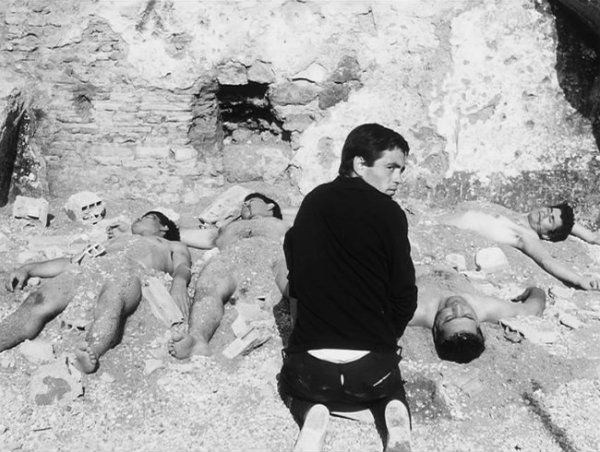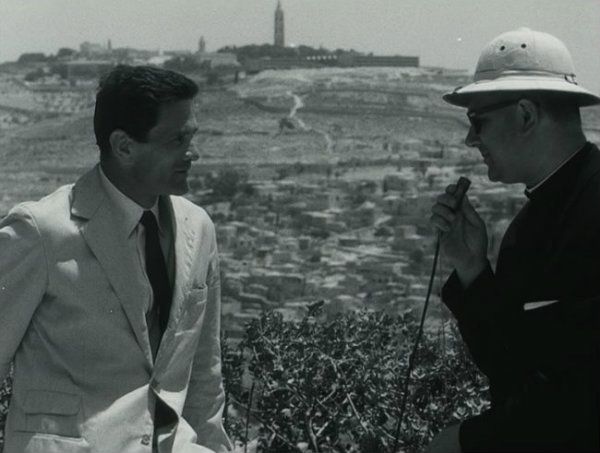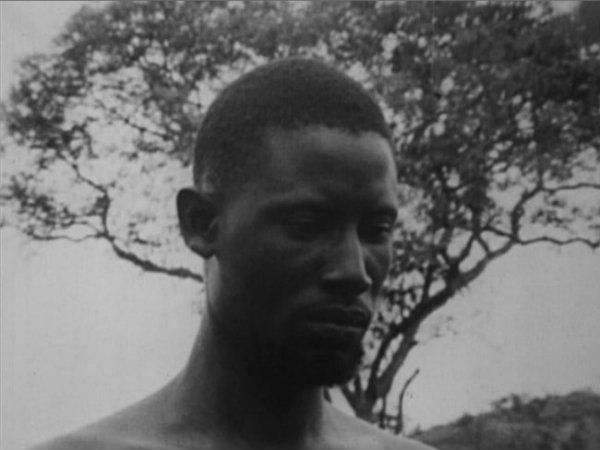
NEW YORK, November 21, 2012--The Museum of Modern Art, Luce Cinecittà, and Fondo Pier Paolo Pasolini/Cineteca di Bologna present Pier Paolo Pasolini, a full retrospective celebrating the filmmaker's cinematic output, from December 13, 2012 through January 5, 2013, in The Roy and Niuta Titus Theaters. Pasolini's film legacy is distinguished by an unerring eye for cinematic composition and tone, and a stylistic ease within a variety of genres--many of which he reworked to his own purposes, and all of which he invested with his distinctive touch. Yet, it is Pasolini's unique genius for creating images that evoke the inner truths of his own brief life that truly distinguish his films. This comprehensive retrospective presents Pasolini's celebrated films with newly struck prints by Luce Cinecittà after a careful work of two years, many shown in recently restored versions. The exhibition is organized by Jytte Jensen, Curator, Department of Film, The Museum of Modern Art, and by Camilla Cormanni and Paola Ruggiero, Luce Cinecittà; with Roberto Chiesi, Fondo Pier Paolo Pasolini/Cineteca di Bologna; and Graziella Chiarcossi.
The film retrospective will be accompanied by a series of events that pay tribute to Pasolini's multifaceted career. On December 14, an evening of recitals by well-known Italian and American actors highlights Pasolini's accomplishments as an acclaimed essayist, beloved poet, and composer. On December 16, MoMA PS1 will host a program of performances by contemporary artists inspired by Pasolini. A roundtable discussion about his artistic legacy will take place on December 12 at Casa Zerilli-Marimò, New York University, and on December 13, The Italian Cultural Institute hosts a seminar titled Pasolini: A Writer for the New Millennium, with a panel of experts, moderated by Fabio Finotti, and a book launch of Pier Paolo Pasolini, My Own Cinema, an anthology including interviews, stories, journal notes, preliminary texts, subjects, and screenplays from Pasolini's archives; edited by Pasolini's sole heir Graziella Chiarcossi, with the collaboration of Roberto Chiesi (Fondo Pasolini/Cineteca di Bologna) and published by Cineteca di Bologna and Luce Cinecittà.
MoMA PS1 presents Saló, or 120 Days of Sodom, Teorema and Medea as continuous cinematic installations running throughout the film retrospective. Opening on December 15, Location 1 will host a gallery exhibition bringing together over 40 rarely exhibited drawings and paintings by Pasolini from the Fondo Pier Paolo Pasolini holdings in the Archivio Contemporaneo "Alessandro Bonsanti" at the Gabinetto Scientifico Letterario Vieusseux in Florence, Italy.

ACCATONE
Pasolini's portrayal of a sub-proletariat in Rome (based on his own novel, A Violent Life) is both raw and tender in his debut feature. Franco Citti's scrounger is an affable pimp who is destined for a self-destruction. He gets into drunken brawls in his usual neighborhood hangouts and tricks his friends for a bowl of pasta. He tries to go straight after falling in love with an innocent girl but slips back into thieving. With non-actors playing themselves and sluggish pacing, Accatone is an uneven ride. But one can't deny its raw lyricism and beauty.

IN SEARCH FOR LOCATIONS FOR THE GOSPEL OF ST. MATTHEW
From the beginning of his Palestine trip in 1964, it is clear that Pasolini can't find the setting he wants in Isreal, the Occupied Territories or Jordan. He is surprised by the uncinematic nature of historical sites with Biblical importance. The documentary is a good example of how Pasolini's working method is like. Humbled by the underwhelming scenery but not discouraged, and yet with an emphasis on authenticity (but not on a superficial level like Mel Gibson's bombastic The Passion of Christ, where he made every actor speak Aramaic), he later ended up shooting The Gospel According to St. Matthew in a remote Italian village, with locals playing most of the parts. This documentary is an important companion piece to that austere masterpiece.

THE EARTH AS SEEN FROM THE MOON
Pasolini was asked to be part of several omnibus films in the 60s (all his segments represented in this retro). The Earth as Seen from the Moon is one of the five segments from the film The Witches. Other directors involved were Mauro Bolognini, Vittorio De Sica, Franco Rossi and Lucino Visconti, each contributing a short involving the biggest Italian starlet of the era, Silvana Mangano. This candy colored, slapstick comedy features the famed comedian Totò and Ninetto Davoli as father and son (they also starred in Hawks and Sparrows as father and son which is said to be Pasolini's favorite), on the road looking for a perfect wife and mother. They find one in Mangano's deaf witch, who marries into the family without questioning. They are all happy living in squalid shack. But the father and son want the best for the new wife and mom, so they devise a plan to earn money. Mangano pulls out an adorable Chaplin act. Lighter and sillier than his other, more satirical films, The Earth as Seen from the Moon shows Pasolini's versatility as an artist.

NOTES FOR AN AFRICAN ORESTEIA
Pasolini preps the Greek tragedy of Orestes in Africa (Tanzania, Uganda). Like the previous documentary, Notes for an African Oresteia is a loose travelogue of sorts - part location/talent scouting, part lecture and discussion, part jazz improvisation. He saw parallels in the newly independent Africa (many nations gained their independence in the 60s) with Orestes and his trial after killing his mother Clytemnestra in revenge of the murder of his father Agamemnon (shedding off traditional ways and moving onto democracy). Under the shadow of the bitter Biafran War (1967-70), Africa in the 70s was still a volatile place to be. They thought the communist proletariat society (with the support of China) was possible. There is an interesting segment in Notes, where Pasolini asks room full of African college student about the film he is trying to make. Unfortunately, the English dubbing doesn't extend to the answers of the African students who speaks French and Italian. From what I gather, they don't seem to agree with the filmmakers view of Africa as a whole. But Pasolini is a smart, inquisitive man. While being respectful, he admits that shooting this film in the 70s in Africa is already outdated. It's too bad the film never actually happened.
For the complete list of films, schedule and tickets for the PPP retro, please visit MoMA website. It runs from December 13, 2012 through January 5, 2013, in The Roy and Niuta Titus Theaters.
No comments:
Post a Comment